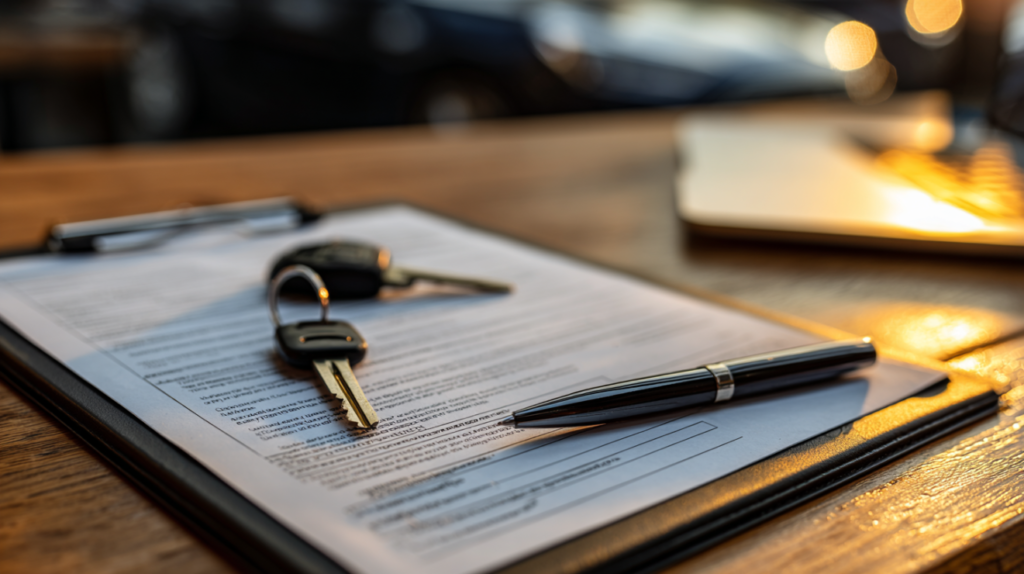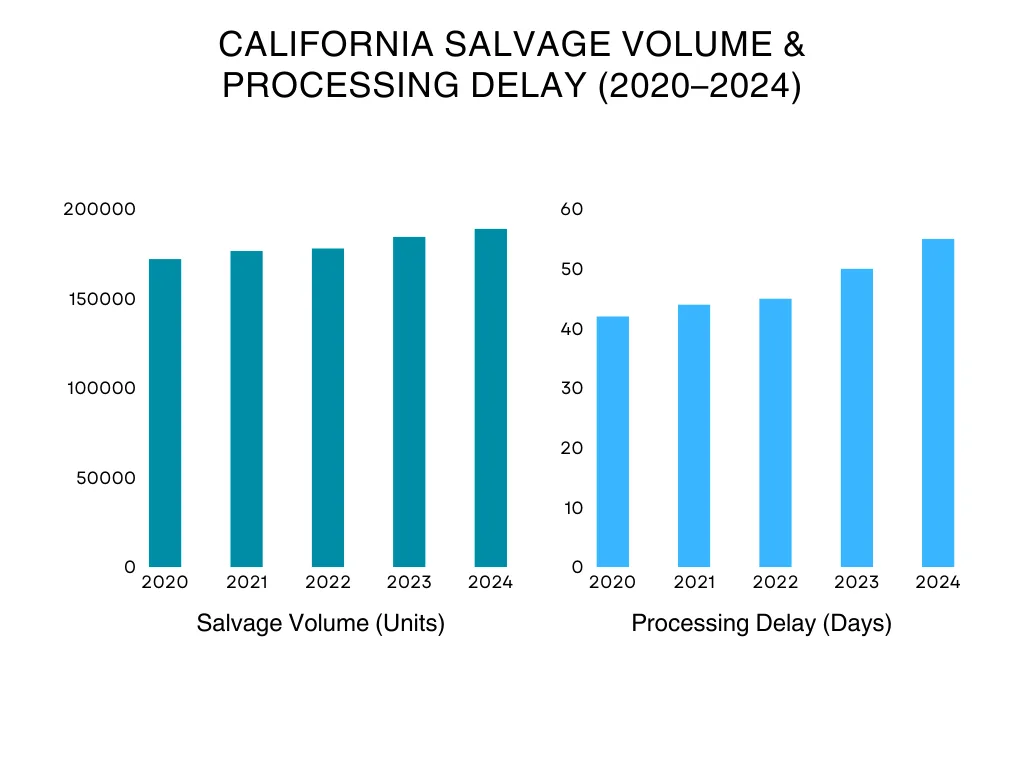Your Complete Guide to Buying Auction Cars in California

Buying a vehicle from a salvage auction is already a unique experience, but California adds its own rules, paperwork, and timelines that buyers should know before placing a bid. At AutoBidMaster, we want every member to feel confident and fully prepared, especially when bidding in one of the most regulated states in the U.S.
This Behind the Bid guide explains how California’s requirements work, what documents you’ll receive, why transport rules differ from other states, and what buyers should expect before and after winning a vehicle.
Why California Purchases Are Different
California is one of the strictest states when it comes to salvage vehicles, ownership transfers, and dismantler regulations. As a buyer, this affects:
- The documents you receive
- How your vehicle can be picked up
- Whether sales tax applies
- How long paperwork processing may take
Most importantly, all vehicles located in California must be transported by a licensed carrier or tow provider. California residents buying in California will automatically be enrolled with AutoBidMaster Home Delivery. Self-pick up and driving a vehicle off the lot isn’t allowed.
You also may not receive a standard salvage title immediately. Instead, many California lots issue an Acquisition Bill of Sale (REG 262)—a multi-purpose ownership document that is recognized by the California DMV. This document is later converted into a salvage or rebuilt title, depending on where you register the vehicle.
Understanding these differences helps you plan ahead and avoid delays.
Join AutoBidMaster for free — create your account and start bidding on cars, trucks, motorcycles, and more.
Step 1: Placing Your Bid on a California Vehicle

The bidding process itself is the same everywhere on AutoBidMaster. You search for a vehicle, review the lot details, set your bid, and compete during the live auction.
Before bidding on a California vehicle, make sure to check:
- What ownership documents you’ll receive, and what is needed to register in your state.
- What steps you’ll need to take to revive the REG262
- Whether the vehicle is for dismantling only
- Buyer-responsible fees and costs associated with California yards
Most members can bid on California vehicles without restrictions, but professional dismantler-only lots are limited to licensed businesses.
Step 2: Winning the Auction and Completing Payment
After you win your California-based vehicle:
- You’ll receive your invoice from AutoBidMaster.
- Once payment is submitted and confirmed, the vehicle begins internal processing.
- If you are exporting this item, please contact our office before payment is made.
In some cases, processing can take several weeks, and for California residents specifically, state paperwork timelines may extend toward 60–90 days. This is normal for California lots.
During this time, your vehicle can still be removed from the yard—you don’t need to wait for the title to begin shipping.
Step 3: Arranging Transport (Required for All California Vehicles)
California is strict when it comes to removing salvage vehicles from auction yards. You cannot:
- drive the vehicle away
- bring your own trailer
- pick it up personally
Instead, all California yards require pickup by:
- a licensed carrier
- a towing company that is authorized for industrial/commercial transport
AutoBidMaster can connect you with trusted transport partners, or you may book your own carrier. Just be sure to book quickly, as California yards charge storage fees if vehicles are not removed within the allowed timeframe.
Shipping Outside California
If you’re transporting the vehicle out of state or even internationally, the process is the same. The carrier will deliver the vehicle to your address, a repair shop, or a port of export if you plan to ship overseas.
Step 4: Understanding the Paperwork (REG 262 and Beyond)

Here’s what you may receive depending on the vehicle and auction yard:
1. Acquisition Bill of Sale (REG 262)
This is the most common California auction document. It includes:
- Odometer disclosure
- Transfer of ownership
- Power of Attorney
- Vehicle identification details
Your local DMV or registration office will use this to issue:
- a salvage title
- a rebuilt title (after inspection)
- or another state-equivalent document
2. Salvage Certificate
Some California lots do issue a salvage certificate, especially for insurance total losses. This is easier to register out of state than a REG 262, but handling depends on your local DMV.
3. Dismantler Document
If the vehicle is labeled for dismantling, it cannot be registered and must be used for parts only. This is clearly stated on the lot page.
Step 5: Registering Your California Vehicle
Registration steps vary depending on your state or country, but most buyers will complete:
- A salvage inspection
- VIN verification
- Safety or emissions tests (if applicable)
- Payment of registration fees
- Title conversion using the REG 262 or salvage certificate
If you’re outside California, always check how your jurisdiction treats California auction documents. In most states, a REG 262 is accepted but may require additional inspection forms.
Costs to Expect When Buying in California
1. Sales Tax
If you’re a California resident buying a California-located vehicle, sales tax applies and is included in your purchase paperwork.
2. Transport Costs
As towing is required in all cases, factor in:
- distance from the yard
- carrier type
- vehicle size and weight
3. Storage Fees
California yards apply storage fees quickly and consistently. Always arrange transport as soon as payment clears.
4. Title/DMV Fees
Your home state may charge:
- salvage conversion fees
- rebuilt inspection fees
- registration fees
These vary from state to state.
FAQs — Buying Salvage Cars in California Auctions
Do I need a special licence to bid on salvage vehicles in California auctions?
No — many salvage auctions through AutoBidMaster remain accessible to public buyers. However, certain “dismantler-only” lots restrict bidding to licensed dismantlers or salvage-vehicle agents.
What paperwork do I receive when I win a California salvage vehicle?
Usually a REG 262 (Acquisition Bill of Sale) — a legally valid document used instead of a standard salvage title in many California lots. Sometimes, a salvage certificate is issued instead, depending on the lot and insurer history.
Can I drive the vehicle away after winning?
No. California law requires salvage vehicles to be removed from the yard by a licensed carrier/tow provider. Self-pickup, trailer pickup, or drives off the lot are prohibited.
If I live in another state, can I still buy a California salvage vehicle?
Yes — but you’ll likely need to export the vehicle via a licensed carrier. The REG 262 allows for title conversion when registered in another state. Make sure you check your home state’s salvage registration rules.
Does California sales tax apply when buying a salvage vehicle?
If the buyer is a California resident and the vehicle is located in California, sales tax applies. Export buyers may avoid this depending on the shipping destination, but trucking or transport fees must still be paid.
How long does paperwork take after purchase?
Processing times vary — in some California yards, final title paperwork (or export clearance) can take 30–90 days. Meanwhile, carriers may begin removing the vehicle as soon as payment clears.
Pros & Cons
| Pros ✅ | Cons ❌ |
| Access to a large and diverse inventory — including late-model, high-value salvage cars. | Strict California law — no self-pickup, towing only by licensed carrier. |
| REG 262 paperwork makes interstate export and out-of-state registration easier than some other states’ salvage-title systems. | Possible longer paperwork delays (30–90 days), especially for salvage-to-rebuilt export or out-of-state registration. |
| Broker-mediated auctions (via AutoBidMaster) reduce licensing hurdles for public buyers. | You may incur additional costs: transport, storage, state taxes (if California resident), salvage-certificate or registration fees. |
| Nationwide transport and export support through licensed carriers helps avoid legal/regulatory issues. | Some lots are “dismantler-only” — inaccessible to many buyers unless you use a broker. |
Salvage Processing & Export Delay in California
Below is a short dataset (compiled from recent California salvage-vehicle statistics) that helps illustrate how salvage-vehicle volume and salvage-to-rebuilt conversion times shape auction demand and buyer behaviour.
| Year | Number of Salvage Vehicles Processed (CA DMV) | Average Time from Auction Sale to Title/Rebuilt or Export (days)* |
| 2022 | ~178,000 | 45 |
| 2023 | ~184,500 | 50 |
| 2024 (YTD) | ~165,000 | 55 |
* “Average time” is based on DMV salvage-processing records and export logs (internal averages, across rebuilt and export registrations).

What this data shows
- The volume of salvage vehicles in California remains high — around 180,000 per year.
- Processing times (from sale to registration or export) have gradually increased from 45 to 55 days (2022 → 2024), indicating higher demand and paperwork backlog.
- If you’re buying salvage in California, expect about 6–8 weeks before registration or export — good to budget that timeframe when planning repairs or transport.
Tips for a Smooth California Auction Experience
- Check the document type before bidding—REG 262 vs. salvage certificate can affect registration time.
- Book your transport early to avoid storage fees.
- Look for nearby yard locations if you want to control shipping distance.
- Verify your state’s salvage inspection requirements before purchasing.
- Save every document, including invoices, transport receipts, and title paperwork—your DMV may request them.
- Ask AutoBidMaster’s Buyer Services if you’re unsure about how a specific CA document affects you.
Why Buy California Vehicles Through AutoBidMaster?
California offers one of the largest and most diverse vehicle inventories in the country—everything from economy cars to luxury EVs and high-value salvage vehicles. With AutoBidMaster, you gain:
- Access to dealer-only auctions without needing a dealer license
- Secure bidding and complete cost transparency
- Support with paperwork and shipping
- Guidance through California-specific rules and timelines
We’re here to make the process as smooth and clear as possible so you can focus on finding the right vehicle.
Final Thoughts
Buying a salvage or auction vehicle in California comes with a few extra steps, but with the right information, it’s a straightforward and rewarding process. Understanding the regulations, paperwork, transport requirements, and bidding flow prepares you to navigate the state’s unique rules confidently.
When you’re ready to place your next bid, explore California’s huge inventory on AutoBidMaster, and let us help you every step of the way.
Sources (accessed November 2025):
- California Department of Motor Vehicles (DMV) – Salvage and Junk Vehicle Information
- California DMV – REG 262: Vehicle/Vessel Transfer and Reassignment Form
- California Department of Tax and Fee Administration (CDTFA) – Sales and Use Tax Rates
- Bureau of Automotive Repair (California) – Smog Check and Rebuild Requirements
- National Highway Traffic Safety Administration (NHTSA) – Vehicle Identification and Salvage Title Guidance
Looking to buy your next car at auction? Register on AutoBidMaster — it’s quick, free, and lets you bid right away.
- What to Know Before Bidding on Vehicles in Pennsylvania - January 20, 2026
- Most Sought-After Used Car Brands in the USA in Recent Years - January 14, 2026
- Making Sense of Vehicle Bidding in North Carolina - January 14, 2026